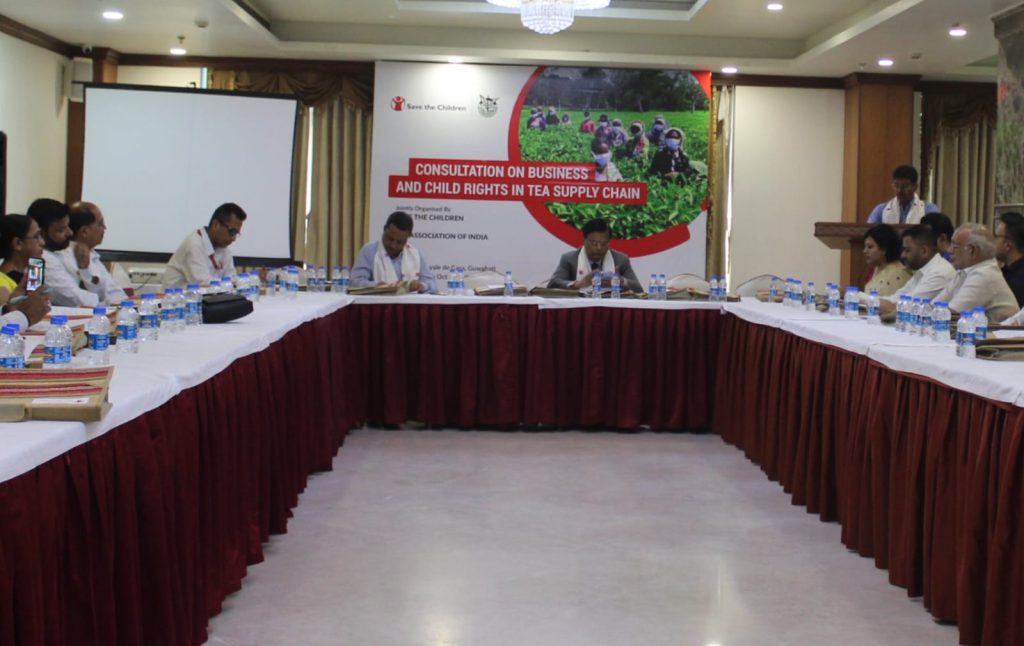
The Tea Association of India along with the Save the Children organized a consultation on ‘Business and Child Rights in Tea Supply Chain’ to create a platform for various stakeholders including tea growers, producers, associations, marketing companies, NGOs, UN, Government, media and academia to deliberate on the current scenario and agree on a way forward in realising the rights of children and community. The consultation was held on October 17 in Guwahati.
Around the world, corporates and organisations are inspired by the adoption of the Sustainable Development Goals, which aim to address extreme poverty, fight inequality and injustice and protect our planet. Actions by businesses are essential to achieve these goals. Businesses contribute to sustainable development with a productive workforce, economic and political stability and increased market potential. The SDGs provide a global aspiration and direction that can stimulate innovation and investments.
The business has the potential to significantly improve the lives and rights of children. Children's and children’s rights are inextricably linked to business success and sustainability.
The tea supply chain comprises a lengthy journey from the bush to the cup/ consumer which subsumes a whole gamut of stakeholders. While the cultivator/producer sets into motion the supply chain involves transporters, warehousing, brokers, buyers, racketeers retailers and outlets. However, the focus has always been on the producers as it involves a workforce of well over a million workers in India.
The industry has put forth self-guiding principles of self-regulation and as early as in the early nineties even did away with concepts such as differentiating " wages" such as " child " wages or " adolescent " wages and is governed by a single wage entitled" adult" wages. In the meantime, the government of India along with the states introduced far-reaching flagship programs like ICDS, Anganwadi workers, right to education which has opened up a new world for the development of " child" residents in the garden. The tea sector had been an enthusiastic partner in these schemes to the extent that opportunities for unfolding and blossoming of children resident in the industry had been progressing in leaps and bounds.
The recent emphasis of Govt. of India on skill development coupled with the vigorous pursuit of skill development is acting as a catalyst for child development in the tea industry.
Chittapriyo Sadhu, Deputy Director – Programme Management, Save the Children explained the current context of child rights in the tea supply chain and the role of business in promoting the same. Touching upon the framework of UN guiding principles on business practices and the National Guidelines on Responsible Business Conduct, he appealed to the participants to come forward with proactive actions to contribute to upholding human rights and specifically the rights of children.

Speaking on this occasion, PK Bhattacharjee, Secretary General, of the Tea Association of India said that the tea supply chain comprises a lengthy journey from the bush to the consumer which subsumes a whole gamut of stakeholders. He emphasized some of the initiatives already taken in the tea plantations. He also emphasized leveraging the Government programmes and schemes for the benefit of the children
The other key participants included Kamal Chandra Baishya-Deputy Director Tea Board, Dipanjal Deka, Secretary, of the Tea Association of India, Guwahati, Laxminarayan Nanda, Child Protection Specialist – UNICEF, Ramen Lal Baishya, Director of Tea, Industries and Commerce Department, GoA, Dr Aditi Smith Gogoi, Asstt. Professor, Assam Agriculture University, Jorhat, Dr Shyamal Prasad Baruah, Head of Department. Agronomics and STG Cell, TRA, Jorhat.
The consultation came up with proposals such as preparing plantation-level plans on child rights, emphasising responsible sourcing etc.
ALSO READ : Jal Board fires Gammon from JICA-assisted project; company makes final exit from Guwahati.